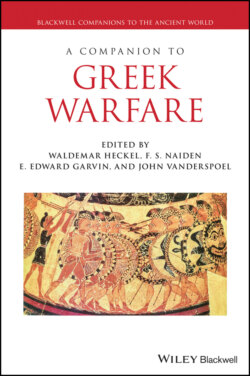Читать книгу A Companion to Greek Warfare - Группа авторов - Страница 39
The Corinthian War (395–387/386)
ОглавлениеThe generation-long Peloponnesian War resulted in the collapse of the polarization between Athens and Sparta and left a lasting legacy on Greece.31 The optimism that the defeat of Athens would bring freedom to the Greeks was demonstrated almost immediately to be illusory, as the insular Spartans proved utterly incapable of managing an empire beyond the Peloponnese and the brutality of their rule soon made them even more unpopular than the Athenians.32 Furthermore, the Spartans’ failure to destroy Athens at the end of the Peloponnesian War left their allies restless and unsatisfied (Xen. Hell. 2.2.19–20). Thebes, Megara, Argos, and Corinth immediately defied the Spartans by receiving exiles from the Spartan-backed government of the Thirty in Athens,33 and the Boeotians and Corinthians refused to participate in the Spartan attempt to dislodge the Athenian democratic forces from the Piraeus (Xen. Hell. 2.4.30; cf. 3.5.5). Shared animosity to Sparta soon resulted in a rapprochement between Thebes, Corinth, and Athens, whose individual goals (respectively the hegemony of Boeotia, greater independence in the Peloponnese, and restoration of their sea empire) would all be furthered by challenging Spartan imperialism.34 It was not until the Persians intervened directly by offering financial support for this anti-Spartan coalition (now joined by Argos) to foment war against Sparta in Greece (thereby forcing the Spartans to withdraw their forces from Asia Minor, where they were trying to liberate the Greek cities),35 that the outbreak of the Corinthian War occurred.
The war began in 395 with a dispute engineered by the Thebans between Phocis and Locris, both of whom appealed to their allies. Lysander advanced to Haliartus in Boeotia, hoping that victory there would bring a speedy end to the conflict, but was defeated and killed before Pausanias could arrive with reinforcements.36 The following year saw two large-scale hoplite battles at the Nemea River near Corinth (before the return of Agesilaus from Asia Minor) and Coronea in Boeotia (after his return).37 Sparta’s failure to gain a decisive victory resulted in a stalemate marked by ongoing conflict around Corinth for control of the isthmus. The Spartans were frustrated also in their attempts to end the war through diplomacy,38 and it was only when the Persians became alarmed by Athens’ growing naval resurgence and renewed control of the Aegean that peace was signed in 387/386.
